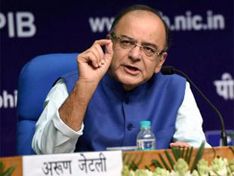
NEW DELHI, Oct 27:
Terming disinvestment target as challenging, Finance Minister Arun Jaitley today said lower receipts will not upset the fiscal maths and there will be no difficulty in meeting the fiscal deficit target of 3.9 per cent set for the current financial year.
“I don’t think there are any concerns (on fiscal deficit) … I had consciously kept a very modest fiscal deficit target that is the movement from 4.1 per cent which eventually became 4 per cent to 3.9 per cent (in 2015-16). The manner in which tax revenues and expenditure are moving, I don’t see there’s going to be any difficulty,” he said.
Admitting that disinvestment is a challenge mainly on account of global problems, Jaitley said the “metal stocks are not doing particularly well, and metal was a large part of kitty that we had planned for this year. I don’t think it makes sense divesting at a time when prices are low”.
Government had budgeted to raise Rs 69,500 crore through disinvestment in the current fiscal. Of this, Rs 41,000 crore was to come from minority stake sale in PSUs and another Rs 28,500 crore from strategic stake sale.
With seven months of the current fiscal about to be over, the government has been able to sell sell stake only in four companies — PFC, REC, Dredging Corp and IOC — to net Rs 12,600 crore.
Minister of State for Finance Jayant Sinha too said that disinvestment process is challenging because of global commodities slowdown and many identified PSUs are from this space.
“Whether it is Coal India or OMCs (Oil Marketing Companies) and so on. They are impacted by global commodity prices,” Sinha said at an event in Mumbai.
“I don’t think it makes sense divesting at a time when prices are low,” Jaitley said.
On GST, Jaitley said the government will try and persuade the opposition to allow Parliament to function so that the Bill on the indirect taxes regime can be passed.
The Government does not have the requisite numbers in the Rajya Sabha, he said, adding that “we don’t have to wait for 5 years. The numbers change every two years and this April, they are going to change further for the better”.
The government had planned to roll out GST, touted as the most comprehensive indirect tax reform since Independence, from April 1, 2016. Keeping that date seems difficult now as the Constitution Amendment Bill is stuck in the Rajya Sabha where the ruling NDA does not have a majority.
Without naming the Congress, he said that some political parties are opposing the GST by disturbing the House. “They didn’t want vote. They wanted just a disturbance to be used as an instrument. I don’t think a Constitutional Amendment can be passed (in disturbance),” Jaitley said.
He said economic reforms can also take place through executive action and there is no stoppage on that.
“We have only a challenge as far as Goods and Services Tax is concerned because this is a Constitutional Amendment and we require a two-third majority,” he said, adding that with support of regional parties the Bill was passed in the Lok Sabha.
When asked if the government would be able to meet the revenue target, he said: “We are still in the mid-year. We still have five and half months more to go. The third and fourth quarters always see a much better growth and much better collections.” (PTI)

